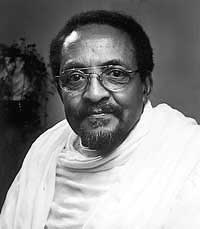Canada Refuses Visa to GM Foods Expert
CBC News
May 20, 2005
OTTAWA - Africa's leading expert on genetically modified foods has been refused a visa to attend a meeting next week in Montreal at the Secretariat for the UN Convention on Biological Diversity.
Ethiopia's chief scientist, Dr. Tewolde Berhan Gebre Egziabher, is critical of genetically modified foods, and his opinions often run counter to those of the Canadian government.

He has been to Canada many times to attend meetings on biodiversity.
He is Africa's chief negotiator for the Cartagena Protocol and he was scheduled to attend meetings about the protocol, the United Nations treaty that governs the international movement of genetically modified organisms.
According to an NGO that has been in contact with Tewolde, the Canadian Embassy refused his entry visa and asked him Thursday to answer questions about his political involvement over the past 35 years.
But Pat Mooney of Etcetera Group, a non-profit organization that's trying to help Tewolde get into Canada, said Thursday it's probably Tewolde's views on genetically modified foods that has the government concerned.
Mooney said Tewolde is an outspoken critic of the "terminator seeds" that are engineered to be sterile, requiring farmers to buy new seeds each growing season. Mooney also said Tewolde was planning to call for the labelling of all genetically modified foods.
"Put these two things together, and the rather remarkable position of the embassy in blocking his visa, and we have to raise the question: is there another agenda here: Is there something going on that's blocking him from attending the negotiations?" Mooney told CBC.
Montreal could be target
He said refusing entry to the Ethiopian scientist may spark an international incident.
"We've heard today from some governments in Africa that if he's not there, if he's barred from attending, there could well be a boycott or a protest in Montreal next week. He is so much the leader that his absence would almost make it difficult to carry on any negotiations," said Mooney.
In 1995, the United Nations decided to locate the Secretariat for the UN Convention on Biological Diversity in Montreal. But one of the requirements for hosting a UN agency is easy access for foreign experts to attend intergovernmental discussions.
"In barring Dr. Tewolde from participating in the Montreal meetings, Canada is jeopardizing Montreal's future as a United Nations city," Eric Darier, a campaigner with Greenpeace, said in a news release.


